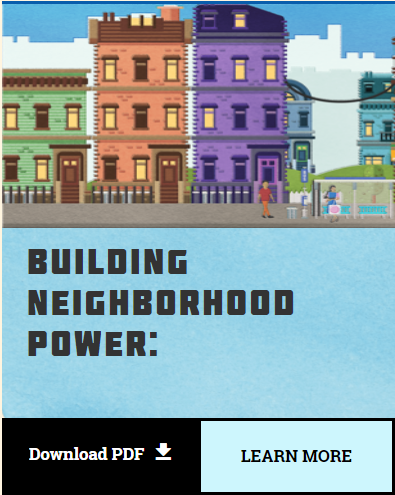
Tools to Engage Webinar Series Part 8: #OurNeighborhoods Anti-Displacement Toolkit
This is the eighth webinar in the Tools 2 Engage series and features Quinn Rhi of National CAPACD and Manisha Lance and Karimah Dillard of Raksha, Inc. Quinn presented the new #OurNeighborhoods Anti-Displacement toolkit, developed by National CAPACD to address gentrification and displacement, and walked us through the toolkit website. Then, Karimah and Manisha introduced us to Raksha, Inc., a Georgia-based nonprofit organization servicing the South Asian community. They discussed the intersections of housing, safety, affordability, and accessibility, and how these issues often result in gentrification and displacement. Raksha, Inc., though not defined by a framework of tenant or neighborhood organizing, is still an organization that makes use of the #OurNeighbhorhoods toolkit as a way to educate communities. At the end of the webinar, the guest speakers discussed the challenges they anticipate on the road ahead, particularly in regard to building leadership in their client populations and finding ways to engage folks who have limited time and capacity.
In case you missed the webinar, we’ve made it easy to watch a recording and download the slides.
Additional resources, organizations, and tools related to the webinar include:
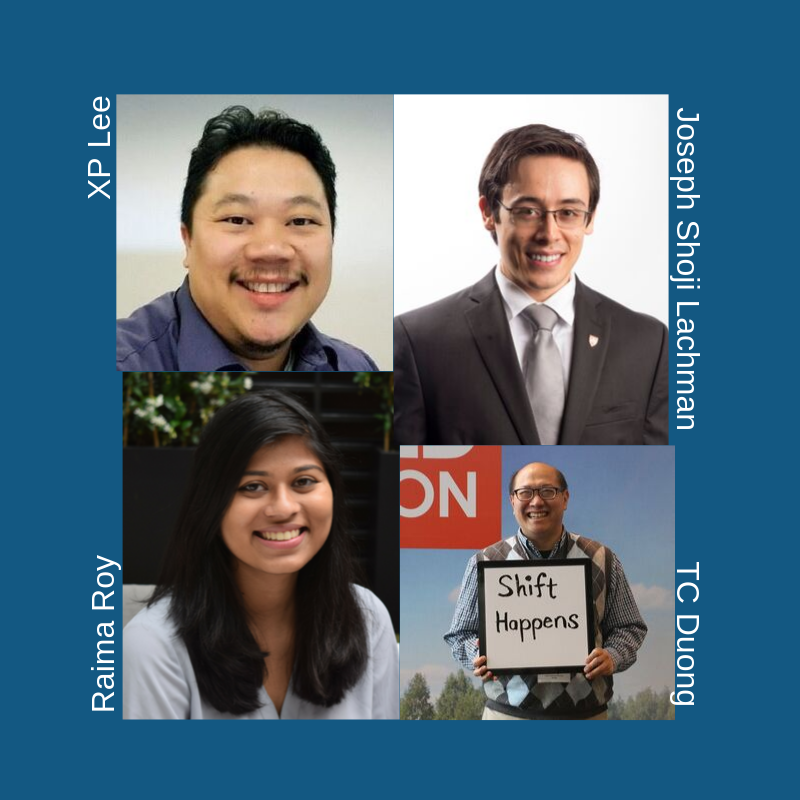
Tools to Engage Webinar Series Part 7: Census, the Citizenship Question, and the Community and Organizational Response
This 60-minute webinar moderated by BMP’s Networking and Learning Manager TC Duong and featuring XP Lee Program Manager for Policy & Special Projects with the Minnesota Council on Foundations, Joseph Shoji Lachman ACRS Civic Engagement Program Manager with Asian Counseling and Referral Service, and Raima Roy from Asian Americans Advancing Justice. These speakers helped explain why being counted in the Census is so important, especially for historically undercounted communities, and how the Trump administration’s efforts to include a question about citizenship in the 2020 Census has erected further barriers to a full and inclusive count. During the webinar, participants also learned about how Asian American and Pacific Islander organizations and networks are organizing and mobilizing around Census 2020 and what shifts they have made to fight back against the citizenship question.
In case you missed the webinar, we’ve made it easy to watch a recording and download the slides.
The links and resources mentioned during the webinar include:
- HmongCensus.org
- Facebook Page for the Washington Census Alliance: https://www.facebook.com/CensusAllianceWA/
- https://www.countusin2020.org/partner-resources
- Washington Census Alliance – info@wacensusalliance.org
- https://mcf.org/2020-census-and-american-community-survey
- Race to Lead Survey: bit.ly/RacetoLeadSurvey

Tools to Engage Webinar Series Part 6: Engaging Constituents, Addressing Root Causes: Food Banks and Beyond
This 60-minute Tools to Engage webinar features Randi Quackenbush and Lyndsey Lyman of the Food Bank of the Southern Tier (FBST) and Alicia Swords, Associate Professor at Ithaca College. In it, Alicia shares some history and insights from her experience working with the University of the Poor and the Poor Peoples’ Campaign to root our conversation in a larger movement to end poverty. Then, Randi and Lyndsey talk about the Speakers Bureau model they’ve developed at FBST, as well as how they are thinking about and using popular/political education to build a shared analysis of the root causes of poverty and hunger. During the Q+A, participants engage around the question of how it is possible for non-profits in general (and food banks in particular) to address root causes and speak honestly about them given the many restraints we face, like funding and capacity.
The resources, organizations, and tools mentioned during the webinar include:
- Kairos: The Center for Religions, Rights, and Social Justice
- Center for Story-based Strategy
- Racial Wealth Gap Simulation
- United for a Fair Economy Ten Chairs Activity
- Closing the Hunger Gap conference – Sept 3-5 in Raleigh NC
- Dropbox of resources gathered from the Constituent Engagement Community of Practice, including information about the Speakers’ Bureau
- To join the Constituent Engagement Community of Practice, click here.
- Tools to Engage webinar series
- Alicia’s article “Action research on organizational change with the Food Bank of the Southern Tier: a regional food bank’s efforts to move beyond charity.”
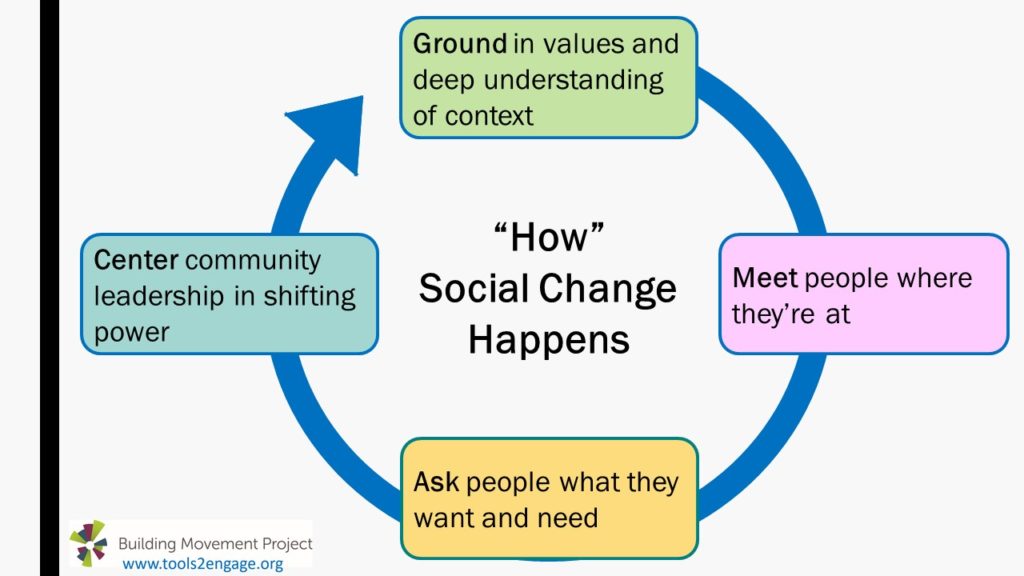
Tools to Engage Part 5: How Social Change Happens, The View From Detroit
How can service providers and organizing groups work together to shift power? Find out in this 60-minute webinar featuring Reverend Roslyn Bouier from the Brightmoor Connection Client Choice Food Pantry and Kea Mathis, Family Engagement Organizer from the Detroit People’s Platform. Rev Roslyn and Kea share insights from the work they are doing in Detroit, and the components that make their approach and partnership unique and justice-oriented. In particular, they explain how their partnership helps connect the dots between food insecurity and public policies that undermine families and put them further at risk, while building community leadership to shift power. Viewers will leave with concrete examples, tools, and next steps for integrating service and social change to address the root causes leading clients to seek services in the first place.
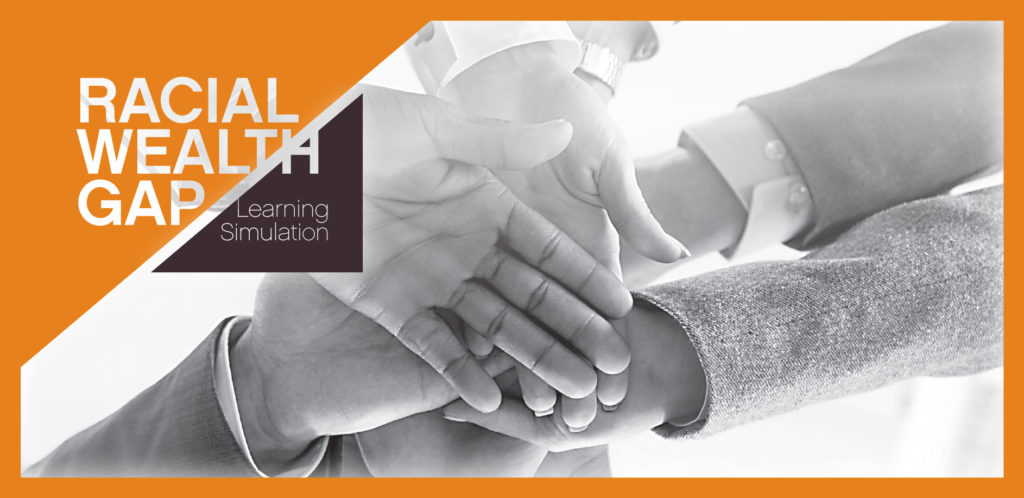
Tools to Engage Webinar Series Part 4: Racial Wealth Learning Simulation
The Building Movement Project (BMP) recently hosted a webinar designed to help listeners gain a deeper understanding of the root causes of hunger and the connections between racial equity, hunger, poverty, and wealth.
In an interview with simulation designer Marlysa D. Gamblin, Domestic Advisor for Policy and Programs, Specific Populations at Bread for the World we learned about Bread’s new Racial Wealth Gap Learning Simulation—an interactive tool that helps people talk about race and learn about the importance of racial equity. Simulation user Marla Karina Larrave, Associate Director for Grassroots Advocacy at National Sustainable Agriculture Coalition, then shared her organization’s experience of applying the tool and the external and internal impacts of the application, as well as challenges and lessons learned along the way.
In case you missed the webinar, we’ve made it easy to watch a recording and download a PDF of the slides.
Below, please find the resources mentioned on the webinar:
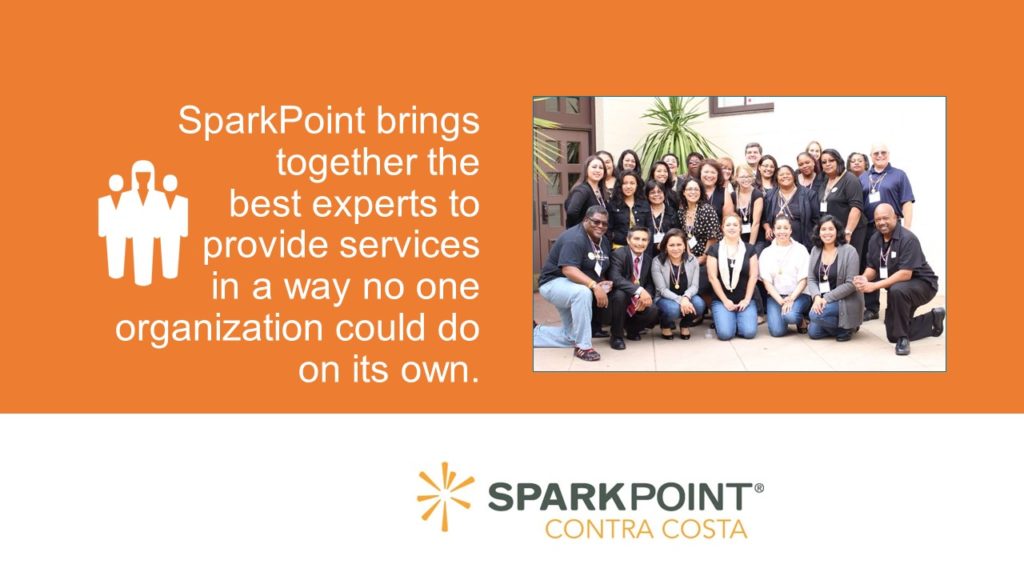
Tools to Engage Webinar Series Part 3: A Deeper Dive into Advocacy
Now, more than ever, direct service organizations are being called upon to advocate for individuals as well as for policy change. By integrating service and social change, organizations can continue to effectively provide needed services, while addressing the root causes that make services necessary. You may be wondering:
- What would integrating service and social change look like for your organization?
- What are some steps you can take, no matter where you are in the process, to more actively engage your constituents?
- How can you build on skills you and your staff already have to make a seamless transition to policy advocacy?
To address these, and many more questions, BMP hosted a webinar (part of our Tools to Engage webinar series) to lift up the work one organization is doing to integrate policy advocacy into the work they’re already doing. In an interview with project consultant Judi Sherman, Executive Director of SparkPoint Contra Costa, Betty Geishirt Cantrell, shared her organization’s experience of volunteering to engage in a “deeper dive” to assess their capacity to integrate policy advocacy into their current service provision and develop a plan for future action. Takeaways include an understanding of the factors helped make this “deeper dive” a success, how the process changed the organization, and how integrating service and social change might not be such a big leap after all.
Watch the recording here, and download a PDF of the slides.
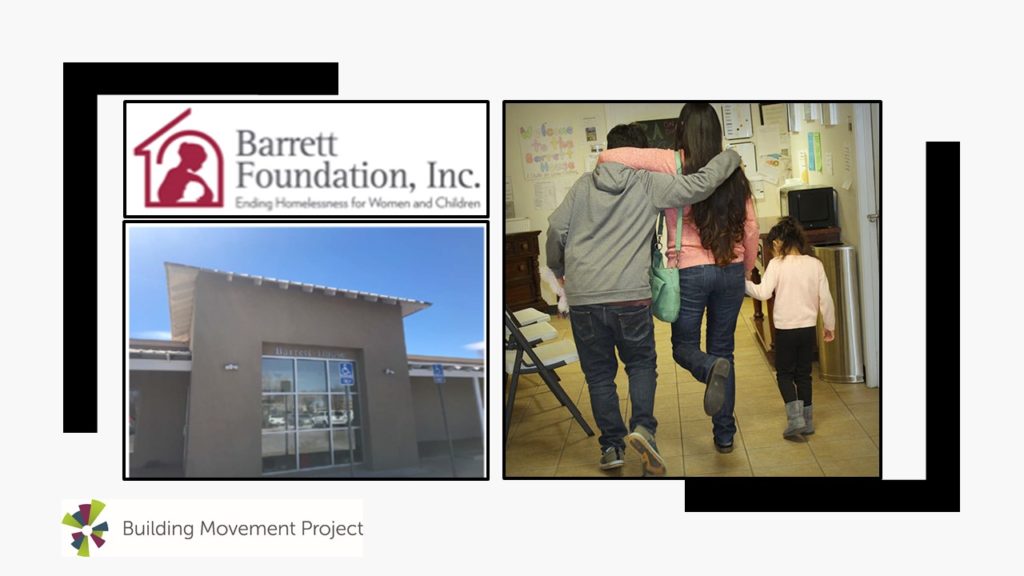
Tools to Engage Webinar Part 2: Barrett Foundation and the Common Good Action Project
This webinar, Barrett House and the Common Good Action Project is part 2 of the Tools to Engage Webinar series. Hear from Building Movement Project consultant Leah Steimel and Connie Chavez, Executive Director of the Barrett Foundation, about the Common Good Action Project in New Mexico and how the Barrett Foundation put lessons from the CGAP cohort into practice to break down silos and transform their Board. Also, learn more about BMP’s Tools to Engage website.
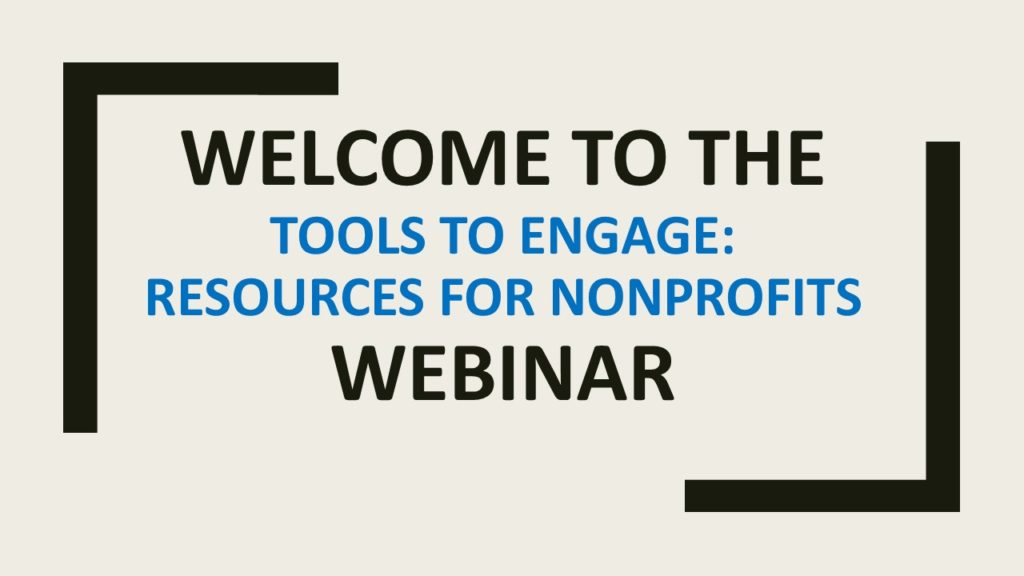
Tools to Engage Webinar Series Part 1: Engage to Change
Maria Mottola, Executive Director of the New York Foundation and Julia Watt-Rosenfeld, Director of Community Organizing and Advocacy at Cypress Hills Local Development Corporation join BMP staff for the first Tools to Engage Webinar to discuss the development and implementation of the “Engage to Change” guide.
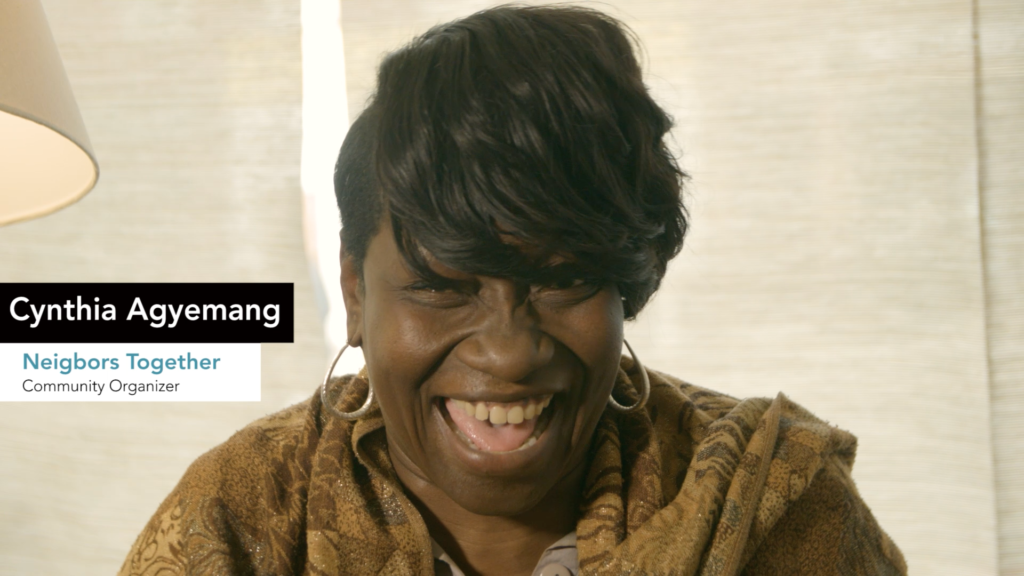
Engage to Change Video Series: Neighbors Together
Explore how some nonprofits are shifting the way they engage the people they serve. Learn how community members moved from being recipients of expertise to becoming partners in transforming their own lives, the organization, and the surrounding community. In a series of conversations with a dozen New York City nonprofits, hear the motivation behind engaging clients and community members as agents of change in challenging times.
In this video we interview Cynthia Agyemang, Community Organizer & Amy Blumsack, Community Action Program Director with Neighbors Together.
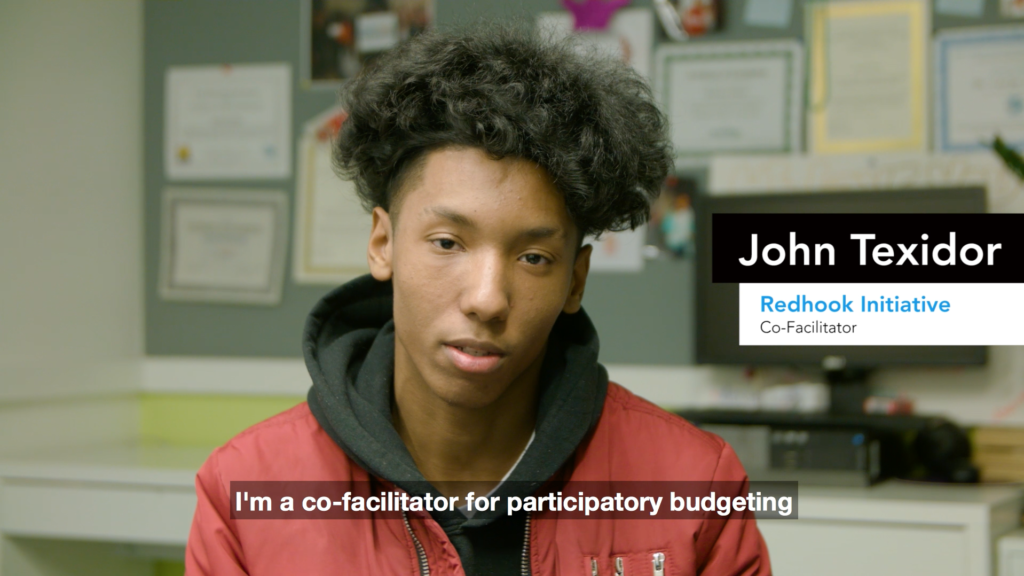
Engage to Change Video Series: Red Hook Initiative.
Explore how some nonprofits are shifting the way they engage the people they serve. Learn how community members moved from being recipients of expertise to becoming partners in transforming their own lives, the organization, and the surrounding community. In a series of conversations with a dozen New York City nonprofits, hear the motivation behind engaging clients and community members as agents of change in challenging times.
In this video we interview John Texidor, Co-Facilitator of Participatory Budgeting & Kiyana Slade, Community Organizer with Red Hook Initiative.
